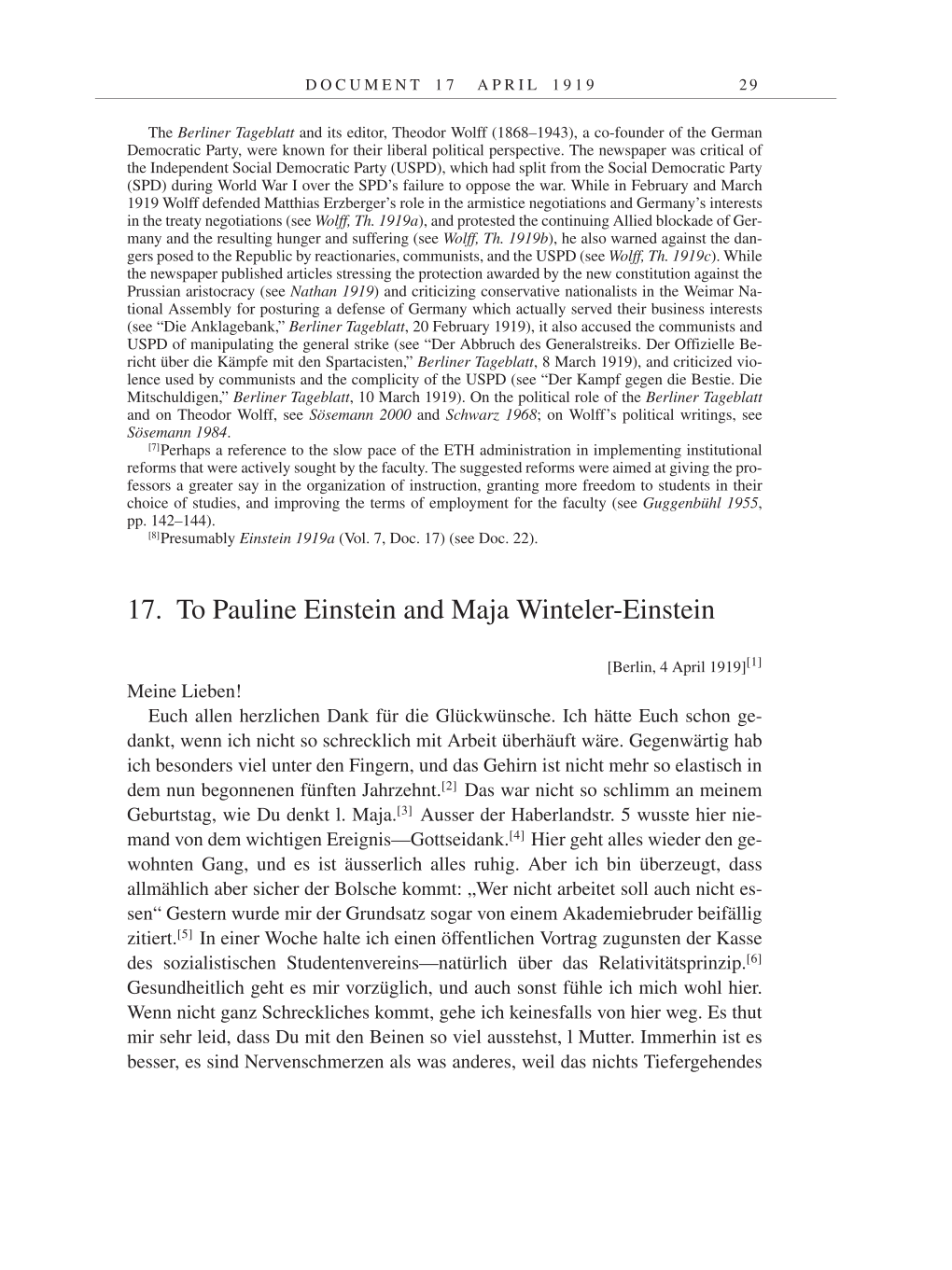D O C U M E N T 1 7 A P R I L 1 9 1 9 2 9
The Berliner Tageblatt and its editor, Theodor Wolff (1868–1943), a co-founder of the German
Democratic Party, were known for their liberal political perspective. The newspaper was critical of
the Independent Social Democratic Party (USPD), which had split from the Social Democratic Party
(SPD) during World War I over the SPD’s failure to oppose the war. While in February and March
1919 Wolff defended Matthias Erzberger’s role in the armistice negotiations and Germany’s interests
in the treaty negotiations (see Wolff, Th. 1919a), and protested the continuing Allied blockade of Ger-
many and the resulting hunger and suffering (see Wolff, Th. 1919b), he also warned against the dan-
gers posed to the Republic by reactionaries, communists, and the USPD (see Wolff, Th. 1919c). While
the newspaper published articles stressing the protection awarded by the new constitution against the
Prussian aristocracy (see Nathan 1919) and criticizing conservative nationalists in the Weimar Na-
tional Assembly for posturing a defense of Germany which actually served their business interests
(see “Die Anklagebank,” Berliner Tageblatt, 20 February 1919), it also accused the communists and
USPD of manipulating the general strike (see “Der Abbruch des Generalstreiks. Der Offizielle Be-
richt über die Kämpfe mit den Spartacisten,” Berliner Tageblatt, 8 March 1919), and criticized vio-
lence used by communists and the complicity of the USPD (see “Der Kampf gegen die Bestie. Die
Mitschuldigen,” Berliner Tageblatt, 10 March 1919). On the political role of the Berliner Tageblatt
and on Theodor Wolff, see Sösemann 2000 and Schwarz 1968; on Wolff’s political writings, see
Sösemann 1984.
[7]Perhaps a reference to the slow pace of the ETH administration in implementing institutional
reforms that were actively sought by the faculty. The suggested reforms were aimed at giving the pro-
fessors a greater say in the organization of instruction, granting more freedom to students in their
choice of studies, and improving the terms of employment for the faculty (see Guggenbühl 1955,
pp. 142–144).
[8]Presumably Einstein 1919a (Vol. 7, Doc. 17) (see Doc. 22).
17. To Pauline Einstein and Maja Winteler-Einstein
[Berlin, 4 April
1919][1]
Meine Lieben!
Euch allen herzlichen Dank für die Glückwünsche. Ich hätte Euch schon ge-
dankt, wenn ich nicht so schrecklich mit Arbeit überhäuft wäre. Gegenwärtig hab
ich besonders viel unter den Fingern, und das Gehirn ist nicht mehr so elastisch in
dem nun begonnenen fünften
Jahrzehnt.[2]
Das war nicht so schlimm an meinem
Geburtstag, wie Du denkt l.
Maja.[3]
Ausser der Haberlandstr. 5 wusste hier nie-
mand von dem wichtigen
Ereignis—Gottseidank.[4]
Hier geht alles wieder den ge-
wohnten Gang, und es ist äusserlich alles ruhig. Aber ich bin überzeugt, dass
allmählich aber sicher der Bolsche kommt: „Wer nicht arbeitet soll auch nicht es-
sen“ Gestern wurde mir der Grundsatz sogar von einem Akademiebruder beifällig
zitiert.[5]
In einer Woche halte ich einen öffentlichen Vortrag zugunsten der Kasse
des sozialistischen Studentenvereins—natürlich über das
Relativitätsprinzip.[6]
Gesundheitlich geht es mir vorzüglich, und auch sonst fühle ich mich wohl hier.
Wenn nicht ganz Schreckliches kommt, gehe ich keinesfalls von hier weg. Es thut
mir sehr leid, dass Du mit den Beinen so viel ausstehst, l Mutter. Immerhin ist es
besser, es sind Nervenschmerzen als was anderes, weil das nichts Tiefergehendes
